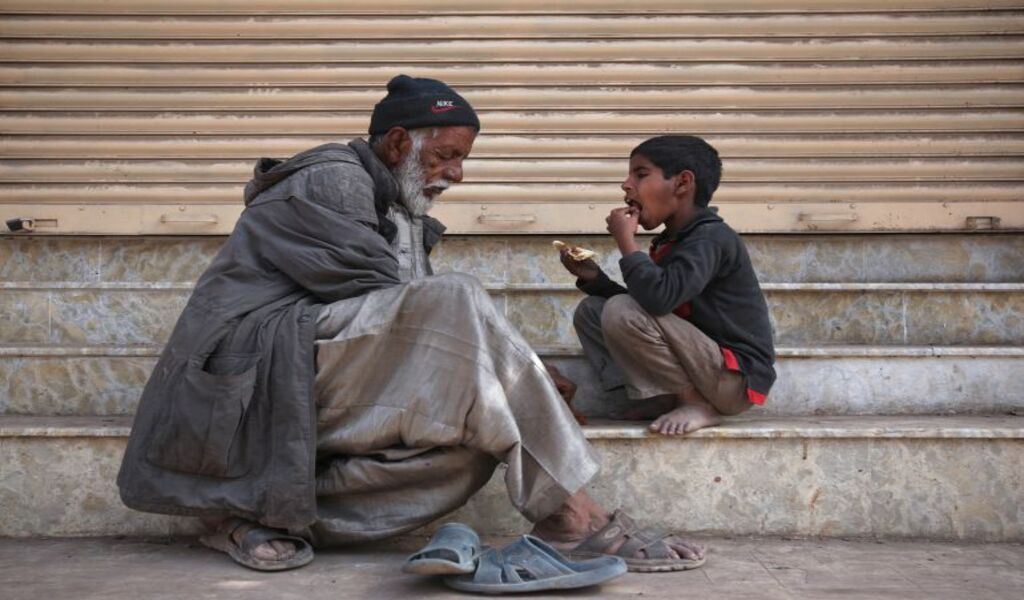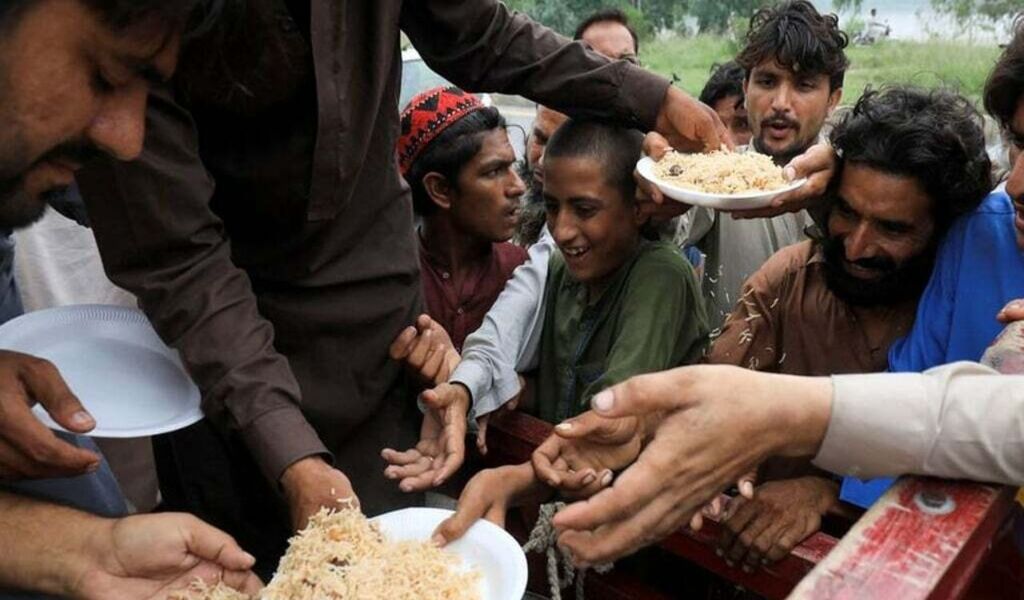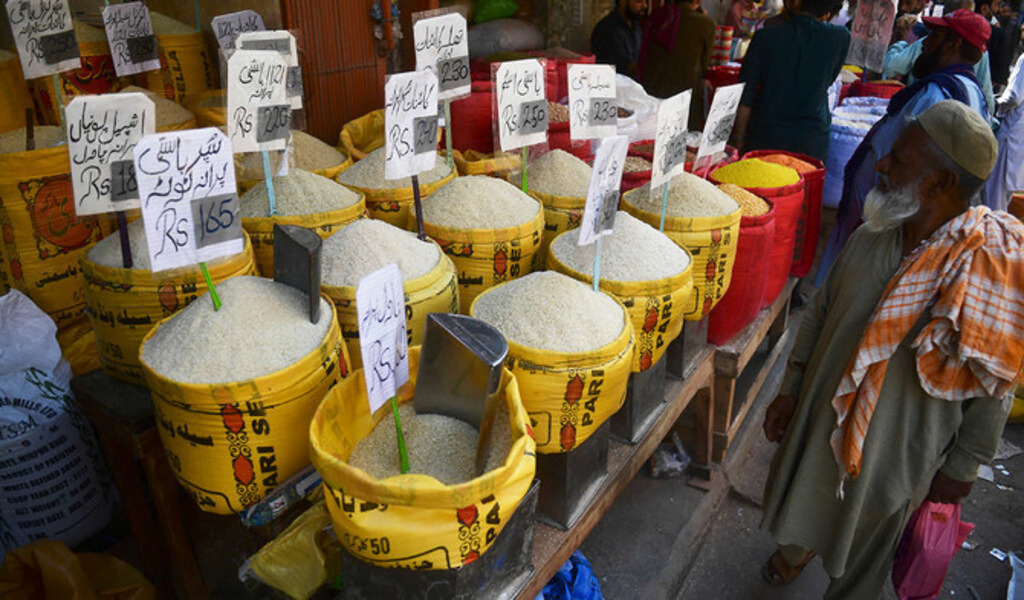(CTN NEWS) – In the realm of global demographics, Pakistan, a nation teeming with humanity and standing as the fifth most populous country, finds itself in a rather disheartening position.
A recent revelation from the Global Hunger Index (GHI) report places Pakistan at the 99th spot out of 129 nations, signifying a distressing “serious” level of hunger that plagues the country.
This significant report, a collaborative effort between the esteemed German non-profit organization Welthungerhilfe and its Irish counterpart, Concern Worldwide, has undergone rigorous peer review to ensure its credibility and accuracy.
Unveiling Pakistan’s Hunger Crisis: Urgent Action Needed to Combat Food Insecurity
The document was unveiled to the world during a momentous event held in Islamabad, the bustling capital city of Pakistan, on a Tuesday that shall not soon be forgotten.
Within the fabric of this deeply profound and meticulously curated report, the distressing reality of Pakistan’s hunger crisis is laid bare. The intricacies of this predicament call for urgent attention and concerted efforts from both national and international entities.
The ramifications of the country’s ranking on the GHI demand immediate action to address the pervasive hunger that has gripped the nation.
The pursuit of alleviating hunger and its associated afflictions is not an insurmountable task. It requires a collective and compassionate approach from governments, non-profit organizations, and compassionate individuals alike.
By fostering sustainable solutions and implementing comprehensive strategies, the dream of a hunger-free Pakistan can be transformed into a tangible reality.
The report highlights a global food crisis, attributing it to a dangerous combination of conflict, climate change, and the COVID-19 pandemic, which has left millions of people exposed to the risk of food shortages.
What is even more concerning, as the report indicates, is that GHI projections predict at least 46 countries worldwide, including Pakistan, will not be able to achieve a status of “low hunger” by the year 2030.
Pakistan’s performance in the 2022 report was distressing, with a GHI score of 26.1, worse than its score of 29.6 in the previous edition of the report published in 2014. Looking further back, the GHI scores for Pakistan were 32.1 in 2007 and 36.8 in 2000.
The situation calls for urgent and concerted efforts from the global community to address the underlying issues of conflict, climate change, and pandemic impact, in order to prevent further deterioration of food security in vulnerable regions like Pakistan and other affected countries.
Global Hunger Report Highlights Severe Food Crisis in Sub-Saharan Africa and South Asia
The report, which was published in October of the previous year, revealed that Sub-Saharan Africa and South Asia continue to experience the most severe levels of hunger, making them highly susceptible to future shocks and crises.
According to the report, South Asia stands out as the region with the highest hunger level globally. Shockingly, it also possesses the highest rates of child stunting and child wasting compared to any other region in the world.
Notably, Pakistan was specifically mentioned, alongside five other countries, for its increasing rates of stunting in children.
The report highlighted certain areas that showed the least improvement over time, where stunting levels either increased or remained stagnant.
These areas include central Chad, central Pakistan, central Afghanistan, northeastern Angola, as well as throughout the Democratic Republic of the Congo and Madagascar.
The findings underscore the urgent need for targeted interventions and global cooperation to address the persistent issue of hunger and malnutrition, particularly in regions like South Asia and Sub-Saharan Africa, and in countries with escalating child stunting rates such as Pakistan.
Efforts to improve food security and child nutrition must be intensified to protect vulnerable populations from further suffering and to build more resilient communities in the face of future challenges.
The release of the GHI report comes after a United Nations report released in May, which categorized Pakistan as an area of “very high concern” due to its severe food insecurity situation.
The UN report, a collaborative effort between the World Food Programme and the Food and Agriculture Organization, painted a grim picture for Pakistan. It projected that over eight million people in the country would likely face “high levels of acute food insecurity”.
These reports underscore the urgent need for immediate attention and comprehensive action to address the pressing food crisis in Pakistan.
The situation demands coordinated efforts from international organizations, governments, and humanitarian agencies to provide essential aid and support to the affected populations and work towards building sustainable solutions to combat food insecurity in the region.
Pakistan’s Tumultuous 18 Months: Navigating a Severe Financial Crisis and Food Insecurity Challenges
Over the past 18 months, Pakistan has been grappling with a tumultuous situation, where an ongoing political crisis has exacerbated the country’s worst-ever financial downturn.
The devastating floods from the previous year inflicted lasting damage on the economy, leading to total losses of over $30 billion, with the agriculture sector alone suffering damages surpassing $100 million.
Adding to the woes, a mounting balance-of-payment crisis has severely depleted foreign reserves, leaving the country indebted to its creditors with a staggering sum of over $77 billion to be paid off within the next three years, as per the International Monetary Fund’s records.
As a consequence, inflation has surged to an all-time high, reaching 38 percent earlier this year, while energy tariffs have also risen due to demands made by the IMF.
Another critical factor affecting Pakistan’s economy is its heavy reliance on imports to meet domestic demands, resulting in the value of the national currency plummeting by more than 50 percent against the US dollar in the past year.
Abedullah, an agriculture economist and chief of research at the Pakistan Institute of Development Economics (PIDE) based in Islamabad, emphasized two crucial issues in the current scenario: accessibility and affordability of food.
He stated that while food is available in the country, the primary problem is affordability, as squeezed incomes have reduced purchasing power, creating a major concern.
Abedullah further highlighted the need for the government to address inflation and curb the devaluation of the Pakistani rupee. He stressed the importance of boosting productivity and improving affordability to alleviate the hardships faced by the people.
Pakistan Struggles with Domestic Wheat Production Targets and Wheat Imports: A Food Security Concern
According to Adil Mansoor, a food security researcher based in Karachi, Pakistan’s domestic wheat production has consistently fallen short of the required targets, leading the country to import at least 10 percent of its wheat for a duration of at least four years.
He expressed skepticism about Pakistan achieving self-sufficiency in wheat production within the next five years, citing the inadequate yields from the seeds used for cultivation as a major hindrance.
While the quality of Pakistani wheat itself is not an issue, the lack of research facilities and expertise in developing improved seeds with higher productivity poses a significant challenge.
Mansoor also pointed out that Pakistan’s wheat exports, particularly to Afghanistan, have increased, driven by the adoption of a market-based exchange rate for the dollar, which has resulted in a more favorable profit margin for exporters.
The situation highlights the need for increased investment in agricultural research and infrastructure to improve crop productivity and reduce reliance on wheat imports.
Developing better seeds and enhancing agricultural practices could play a crucial role in addressing food security concerns in Pakistan and ensuring a stable supply of wheat for its population.
RELATED CTN NEWS:
Seeking Peace In Ukraine: The Role Of African And Chinese Initiatives Amidst Geopolitical Tensions
Urgent Appeals: Calls To Halt Imminent Executions In Singapore For Drug-Related Convictions
China And Russian And Delegation To Attend North Korea’s Korean War 70th Armistice Anniversary






